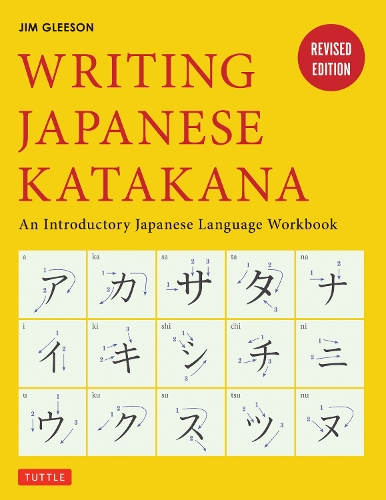
Writing Japanese Katakana: An Introductory Japanese Language Workbook
(Paperback, Second Edition)
Publishing Details
Writing Japanese Katakana: An Introductory Japanese Language Workbook
By (Author) Jim Gleeson
Tuttle Publishing
Tuttle Publishing
7th July 2015
11th August 2015
Second Edition
United States
Classifications
General
Non Fiction
495.611
Physical Properties
Paperback
80
Width 216mm, Height 279mm
284g
Description
This is an introductory guide and workbook to writing Japanese Katakana. Anybody who is able to master English, with its irregular spellings and idiosyncratic pronunciations, is more than equipped to master written Japanese. The hiragana and katakana syllabaries are purely phonetic characters, which function much like the letters of the English alphabet. In this respect, kana are quite different from kanji characters, which are based on Chinese ideographs and which represent ideas. The katakana syllabary is used primarily to represent borrowed words (from languages other than Chinese), although it is also used for botanical names and is sometimes used in place of hiragana or kanji for emphasis. In some ways, the use of katakana in Japanese parallels the use of italics in English. Writing practice is the most effective method of mastering written Japanese, and the large open format of this workbook is designed to invite the student to pick up a pencil and start writing.
Reviews
"Writing Japanese Katakana: An Introductory Japanese Language Workbook is a good book for those who wish to learn Japanese. When studying Japanese, you should start by learning to read and write hiragana, and then, you should study katakana next. Not only will it help you to be able to read signs, menus, etc in Japan, but knowing and using katakana will help you to pronounce foreign words and onomatopoeia in the way that Japanese people understand them." --Tokyo Five blog
"One of the keys to learning Japanese is stroke order and drilling until each stroke is second nature. Jim Gleeson put together a wonderful workbook that lets you do just that." --Japan Powered blog
"Each character is introduced with brushed, handwritten, and typed samples which enhance character recognition. Extensive writing space allows for maximum practice to facilitate memorization and ensure proper character formation. Entertaining illustrations and amusing examples of onomatopoeic usage of hiragana in Japanese writings further reinforce memorization in a fun way." --Just One Cookbook blog
Author Bio
Jim Gleeson, a native of Sydney , Australia, holds an honors degree in the History of Science from the University of New South Wales. He has written for various Australian newspapers as well as many major corporations both in Japan and Australia.
